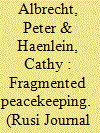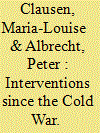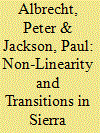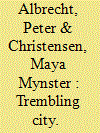|
|
|
Sort Order |
|
|
|
Items / Page
|
|
|
|
|
|
|
| Srl | Item |
| 1 |
ID:
146127


|
|
|
|
|
| Summary/Abstract |
This paper argues that when police reform in Sierra Leone was instituted to consolidate a state system after the country's civil war ended in 2002, it reproduced a hybrid order instead that is embodied by Sierra Leone's primary local leaders: paramount and lesser chiefs. In this sense, policing has a distinctly political quality to it because those who enforce order also define what order is and determine access to resources. The hybrid authority of Sierra Leone's chiefs emanates from multiple state-based and localised sources simultaneously and comes into play as policing takes place and police reform moves forward. This argument is substantiated by an ethnographic exploration of how and with what implications community policing has been introduced in Peyima, a small town in Kono District, and focuses on one of its primary institutional expressions, Local Policing Partnership Boards.
|
|
|
|
|
|
|
|
|
|
|
|
|
|
|
|
| 2 |
ID:
156770


|
|
|
|
|
| Summary/Abstract |
This paper argues that when police reform in Sierra Leone was instituted to consolidate a state system after the country's civil war ended in 2002, it reproduced a hybrid order instead that is embodied by Sierra Leone's primary local leaders: paramount and lesser chiefs. In this sense, policing has a distinctly political quality to it because those who enforce order also define what order is and determine access to resources. The hybrid authority of Sierra Leone's chiefs emanates from multiple state-based and localised sources simultaneously and comes into play as policing takes place and police reform moves forward. This argument is substantiated by an ethnographic exploration of how and with what implications community policing has been introduced in Peyima, a small town in Kono District, and focuses on one of its primary institutional expressions, Local Policing Partnership Boards.
|
|
|
|
|
|
|
|
|
|
|
|
|
|
|
|
| 3 |
ID:
144185


|
|
|
|
|
| Summary/Abstract |
From uncertain beginnings, the African Union Mission in Somalia (AMISOM) has grown, over almost ten years, into the regional organisation's largest peace-support operation. Bolstered by a multilayered mission architecture through which the UN and bilateral donors provide financial, logistical and technical support, it has achieved important gains against the jihadi Islamist organisation Al-Shabaab. The apparent viability of these partnerships has seen AMISOM hailed as a successful model of collaboration between regional and international structures. Peter Albrecht and Cathy Haenlein examine a less-studied dimension of this model, namely the intersection of these arrangements with the structural fragmentation that has increasingly come to define the mission.
|
|
|
|
|
|
|
|
|
|
|
|
|
|
|
|
| 4 |
ID:
154957


|
|
|
|
|
| Summary/Abstract |
The United Nations Multidimensional Integrated Stabilization Mission in Mali (MINUSMA) was established in 2013 to support Mali’s peace process. It represents an emerging practice of deploying UN peacekeeping missions in asymmetrical conflict environments where there is no peace to keep. While MINUSMA represents Europe’s return to peacekeeping, the largest troop contributors by a wide margin are African countries. Through exploring the task of securing mission convoys to the northern regions of the country, Signe Cold-Ravnkilde, Peter Albrecht and Rikke Haugegaard show how inequalities between European and African soldiers shape the distribution of death, danger and supplies in what has been named the world’s deadliest UN mission.
|
|
|
|
|
|
|
|
|
|
|
|
|
|
|
|
| 5 |
ID:
159966


|
|
|
|
|
| Summary/Abstract |
Hybridisation is often conceptualised as a ‘liminal’ occurrence, a ‘contact point’ or the product of an ‘interface’. This tends to invoke the very binaries that the concept seeks to overcome, because it assumes that a meeting between separate entities must occur for hybrid orders to emerge. Instead, this article argues that processes of hybridisation and how they assemble disparate types of authority lie at the very core of how social processes evolve. The argument is substantiated empirically by exploring the internal and external dynamics that have shaped and partly fragmented the security sector of Puntland, the largest and most stable region in Somalia (beyond Somaliland). The analysis centres on attempts by the United Nations (UN) to support the Puntland government in reducing numbers of the region’s constitutionally recognised security forces. In this analysis, the article shows how the Puntland government necessarily has to balance and negotiate conflicting demands of clan leaders, the global and regional security interests of individual governments, notably the United Arab Emirates and the United States of America, as well as continued pressure from the ‘international community’, formally represented by the UN, to act as a functioning regional centre within a federal Somalia.
|
|
|
|
|
|
|
|
|
|
|
|
|
|
|
|
| 6 |
ID:
179819


|
|
|
|
|
| Summary/Abstract |
Through the lens of security sector reform, this article explores shifts in international interventions since the Cold War. Identifying three phases, it traces the global North's failure to transform fragile states into liberal democratic polities and changes to intervention practices in response to that failure. Immediately after the Cold War, an unfettered belief in the liberal peace thesis, and its global applicability, drove interventions that sought to establish an integrated liberal internationalist system of states shaped by mutuality. This changed with 9/11, shifting the focus towards extensive statebuilding exercises to replace, by force if necessary, security sectors and reconstruct failed states as liberal democracies. The current phase reflects lost faith in the global North's transformative potential following experiences in Iraq and Afghanistan. New forms of intervention from a distance have emerged, relying on delegation to technology and militaries of the global South. This type of intervention allows the global North to maintain a sense of influence while shifting the burden of intervention onto the global South's populations and militaries—and foreclosing comprehensive statebuilding. The global North can no longer claim to act on behalf of universally applicable norms, but alternatives have yet to materialize, leaving interventions in an ideological limbo.
|
|
|
|
|
|
|
|
|
|
|
|
|
|
|
|
| 7 |
ID:
181422


|
|
|
|
|
| Summary/Abstract |
This article explores how transitions produce non-linearity in Sierra Leone’s security and justice programming, as it unfolded from the late 1990s and onwards starting in open conflict. Transitions have received limited detailed analytical consideration in the literature on interventions because they are mundane and inevitable, and therefore taken for granted. However, they definitively condition how programmes evolve. We show that transitions can be seemingly small as well as comprehensive, but commonly have unpredictable, hidden and often unmanageable transformative effects on the trajectory of security and justice programmes. To conceptualize the logic of transitioning, ritual theory – and specifically liminality that is a central component of rites of passage – is used to capture the inherent diffuseness and unpredictability of transitioning. Transitions in programming are liminal moments, ‘neither here nor there’, and as such characterized by ambiguity and indeterminacy. The ambiguity, and importance, of transitions stems from their potency to disturb the direction of programming, requiring the suspension of routine, which internationally funded programming is notoriously ill-suited to deal with. Empirically, the article looks at three types of transitions in Sierra Leone: (1) war to peace; (2) turnover of staff; and (3) elections leading to change of the party in power.
|
|
|
|
|
|
|
|
|
|
|
|
|
|
|
|
| 8 |
ID:
135739


|
|
|
|
|
| Publication |
Abingdon, RUSI, 2014.
|
| Description |
x, 184p.Pbk
|
| Series |
Whitehall Paper 82
|
| Standard Number |
9781138892293
|
|
|
|
|
|
|
|
|
|
|
|
Copies: C:1/I:0,R:0,Q:0
Circulation
| Accession# | Call# | Current Location | Status | Policy | Location |
| 058078 | 355.0330664/ALB 058078 | Main | On Shelf | General | |
|
|
|
|
| 9 |
ID:
138431


|
|
|
|
|
| Summary/Abstract |
An ever-growing demand for troops to serve in ever-more complex environments has led to enhanced interest in the incentives and constraints facing newcomers to peacekeeping. Increasingly, these include post-war states from the global South. Peter Albrecht and Cathy Haenlein examine the recent record of Sierra Leone and the factors affecting its patterns of contribution to peace-support operations. In doing so, they stress the need for a full understanding of the specific experiences of conflict and recovery – and the relevance of national identity, financial capacity and domestic crises – in the calculations of states emerging from civil war.
|
|
|
|
|
|
|
|
|
|
|
|
|
|
|
|
| 10 |
ID:
188706


|
|
|
|
|
| Summary/Abstract |
While divided cities are characterized by spatially cemented segregation and polarized divisions, the trembling city is organized around transient and transformative borders. We conceptualize this notion of urban space to capture Freetown’s war-peace transition in the late 1990s and early 2000s. Ex-combatants settled on the city margins, bringing with them spatial strategies from war-fighting into the city by recreating a system of bases. The Sierra Leone Police (SLP) re-emerged with external support, seeking to compartmentalize and fixate Freetown through a combination of force and negotiation. We use borders and bordering to understand policing as attempts by both ex-combatants and the SLP to border in as well as out; defensively against external interference and offensively to make territorial claims. By extension, it is tensions in these practices between attempts to defend and harden borders, and at the same time, expand and soften them that trigger a tremble. The city tremble was a reminder of the possibility of war that Freetown very easily could return to. It also became a more general and inconspicuous condition of the city as an inhabited space, where multiple and often incompatible and conflictual spatial logics, strategies, and practices of policing clashed, overlapped and co-existed uneasily.
|
|
|
|
|
|
|
|
|
|
|
|
|
|
|
|
|
|
|
|
|